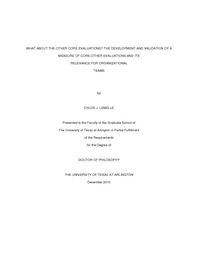
ATTENTION: The works hosted here are being migrated to a new repository that will consolidate resources, improve discoverability, and better show UTA's research impact on the global community. We will update authors as the migration progresses. Please see MavMatrix for more information.
Show simple item record
| dc.contributor.author | Lemelle, Chloe J. | en_US |
| dc.date.accessioned | 2011-03-03T21:51:59Z | |
| dc.date.available | 2011-03-03T21:51:59Z | |
| dc.date.issued | 2011-03-03 | |
| dc.date.submitted | January 2010 | en_US |
| dc.identifier.other | DISS-10961 | en_US |
| dc.identifier.uri | http://hdl.handle.net/10106/5457 | |
| dc.description.abstract | The construct of core self-evaluations has garnered a great deal of attention in the organizational psychology literature and has been hailed as one of the strongest predictors of job satisfaction. However, the construct of core self-evaluations is only one of the three core evaluations that Judge and colleagues originally described in their seminal work (Judge, Locke, & Durham, 1997). It is predicted that much can be explained about the dynamics of teams and the propensity to excel in a team environment through the study of core other-evaluations. With that objective, the current study developed and validated a comprehensive measure of core other-evaluations, referred to as the Core Other-Evaluations (COE) scale. The construction of the measure mirrored the theory of Judge and colleagues (Judge et al., 1997; Judge, Erez, Bono, & Thoresen, 2003), taking a comprehensive approach to scale development and validation. First, a series of pilot studies were conducted to develop the initial item subset, demonstrate support for the construct of core-other evaluations, examine the relations of the core-other evaluation sub-construct manifestations with the core-other evaluation items, and demonstrate support for the psychometric utility of the retained items for the core other-evaluations scale. Then a cross-validation study was conducted to further examine the retained items using IRT techniques, explore construct and criterion-related validity, and investigate the presence of group differences. The results indicated support for the existence and efficacy of the core other-evaluations construct, the predictive power of core other-evaluations with regard to important work criteria, the incremental validity of core other-evaluations over core self-evaluations, and the lack of differential item functioning or group differences with this measure. Taken together, these findings bolster the argument that the construct of core other-evaluations is not only useful in a theoretical context, but also with regard to practical utility. Practical implications and future directions are discussed. | en_US |
| dc.description.sponsorship | Scielzo, Shannon | en_US |
| dc.language.iso | en | en_US |
| dc.publisher | Psychology | en_US |
| dc.title | What About The Other Core Evaluations? The Development And Validation Of A Measure Of Core Other-evaluations And Its Relevance For Organizational Teams | en_US |
| dc.type | Ph.D. | en_US |
| dc.contributor.committeeChair | Scielzo, Shannon | en_US |
| dc.degree.department | Psychology | en_US |
| dc.degree.discipline | Psychology | en_US |
| dc.degree.grantor | University of Texas at Arlington | en_US |
| dc.degree.level | doctoral | en_US |
| dc.degree.name | Ph.D. | en_US |
Files in this item
- Name:
- Lemelle_uta_2502D_10961.pdf
- Size:
- 994.4Kb
- Format:
- PDF
This item appears in the following Collection(s)
Show simple item record


